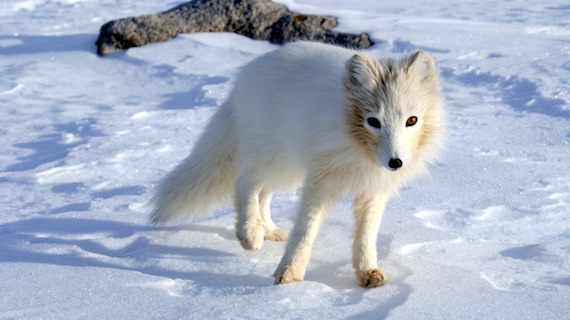Nunavut government issues rabies warning for Igloolik
Tests confirm fox had rabies, dog sent for testing

The GN confirmed April 6 that a fox near Igloolik had rabies, and they’ve sent out a dog for testing. If you’re bitten, wash the wound with soap and water for 15 minutes and immediately contact your local health centre, the GN advises. (FILE PHOTO)
Residents of Igloolik are facing another rabies scare this week, following confirmation by the Government of Nunavut that a fox was found to be carrying rabies.
They’ve also sent out a dog, which was displaying “unusual behavior,” to be tested for rabies, the GN’s Health Department said in a public health advisory on Friday, April 6.
This is one of a series of rabies scares that Igloolik residents have faced in recent years.
In the spring of 2017, at least three dogs in the community of about 1,600 people were found infected with the disease and the GN issued a series of warnings.
Another rabies outbreak near Igloolik occurred in 2012.
“A fox that is sick may appear friendly. Children should not play with foxes or other wildlife,” yesterday’s GN advisory said.
People in Igloolik should keep their domestic animals tied up and keep an eye on them when they are outside, the GN said.
The GN also said rabies vaccinations for domestic animals are available by contacting the Igloolik hamlet office.
The rabies virus infects the central nervous system, causing disease in the brain that can be fatal.
Early symptoms of the virus include fever, headache and general weakness.
If rabies progresses untreated, it can cause insomnia, anxiety, confusion, partial paralysis, hallucinations, an increase in saliva and difficulty swallowing.
To avoid becoming infected with rabies:
• avoid approaching, touching, petting, feeding or adopting unknown, stray or wild animals.
• keep foxes away from houses and areas where domestic animals are kept, for example, by blocking access to buildings and garbage containers.
• have your pet dogs and cats vaccinated against rabies.
• don’t touch the body of a dead or sick animal with your bare hands.
• if you touch the body of a dead or sick animal with your bare hands, wash your hands with soap and water immediately afterwards.
• keep your dogs in a safe place, tied up or on a leash, and do not allow them to wander.
• if your pet is bitten by another animal, handle it with gloves, tie it up or isolate it.
If you’re bitten, wash the wound with soap and water for 15 minutes and immediately contact your local health centre.
You can receive a vaccine for preventing rabies in case of a bite or exposure to the saliva from an infected animal but you must get the vaccine rapidly after contact, with four shots given over 28 days.
If you see a fox or wolf wandering around the community, or if your dog has had contact with a fox or wolf, call the conservation officer immediately at 867-934-8999 or the regional environmental health officer at 867-975-4815, the GN said.





(0) Comments